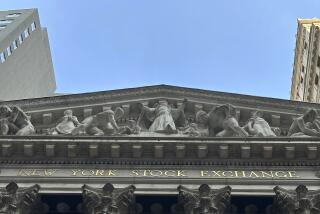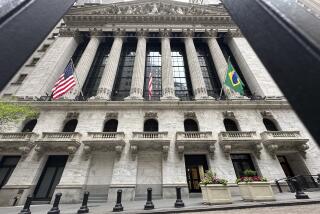Is a Big-Stock Swoon on Tap?
- Share via
After disappointing profit news Tuesday from supposedly consistent earners like Merck and Walt Disney, should investors suddenly worry about highflying blue-chip stocks?
Or should they instead look at the slide in Merck’s shares--and any potential fall today in Disney’s--as great buying opportunities in coveted big-name stocks?
That’s the issue for investors in several blue-chip companies whose ability historically to turn out reliable profit growth has made them investor favorites. That list includes McDonald’s, 3M and Hershey Foods. All either have turned in disappointing results recently or warned that near-term earnings will be softer than expected.
The danger in holding the stocks is that they could undergo sharp short-term declines even though their long-term prospects remain positive. The flip side, of course, is that the market is smack in the middle of a big-stock love fest, and overly skittish investors might pass up a chance to do what seemingly everybody wants to do these days--buy on dips.
For a little insight into today’s situation, it’s worth examining a similar market environment that developed almost a year ago.
In early-August 1997, a similar set of blue-chip earnings jitters hit Wall Street when stalwarts Coca-Cola and Gillette issued surprise earnings warnings a week apart.
*
At the moment of their warnings, both stocks already were well off their earlier highs. Coke was down 8.4% from its peak in mid-June 1997, and Gillette was a whopping 15.3% off its mid-July 1997 high.
So much for the notion that blue chips are invulnerable. And there was more downside to go: Within three months the Asian financial crisis would hit the market with full force. At the bottom, Coke was 31% off its 1997 high while Gillette was down 27%.
Despite the widespread belief that blue chips quickly shake off problems, it took a while for both stocks to make new highs. Gillette didn’t break through its old high until late February; Coke didn’t make a new high until early March.
Still, buying amid the stocks’ declines last year turned out to be quite lucrative. And why not? These companies didn’t get to be giant, extraordinarily successful multinationals by standing still. One of the hallmarks of such blue chips in the 1990s has been their ability to do whatever it takes to keep profits on the upswing over the long run.
For that reason, many analysts believe it would be a bad idea to unload them simply because of one quarter’s profit worries. “I wouldn’t be taking money off the table here,” said Ned Brines, a senior analyst at Roger Engemann & Associates in Pasadena.
Although Disney reported after the market closed that its third-quarter profit fell 2%, Disney is a “hit-driven” business, Brines said. Earnings may weaken temporarily, but extended declines in profit are unlikely for consumer-oriented titans like Disney, Coke and others, analysts note.
As for Merck, the stock fell 7% Tuesday after second-quarter earnings came in at the lower end of estimates. But the company still notched a 15% profit gain. That’s impressive for a company the size of Merck.
So if Merck stock continues to slide, when does it become a great buy? That may be tougher to answer today compared with a year ago, because blue chip valuations in general are so much higher. Merck’s price-to-earnings ratio has risen to 36 now from 24 a year ago, and is twice the company’s earnings growth rate.
“With some of the pharmaceuticals trading at some of the multiples they are, we aren’t sure what constitutes a great buying opportunity,” Brines conceded.
Michael Sandler, co-manager of the Clipper Fund in Beverly Hills, worries that Disney and Merck might be unable to continue growing at their historic rates.
“Disney and Merck are high-quality companies, and we have a lot of respect for the managements of those companies,” he said. “But there’s only so much growth” to be had--and the issue is what to pay for that growth.
(BEGIN TEXT OF INFOBOX / INFOGRAPHIC)
Sinking Blue Chips
These blue-chip stocks, usually viewed as dependable earnings-growth issues, have either disappointed Wall Street recently or are facing increasing doubts about the level of profitability they can maintain.
*--*
1998 Tuesday Pct. decline Company high close from high P/E* 3M $97.88 $82.00 --16.2% 16 Hershey Foods 76.38 65.00 --14.9 28 Walt Disney 42.75 37.75 --11.7 37 Gillette 62.63 56.50 --10.0 44 Merck 139.13 128.56 --7.6 36 McDonald’s 74.94 69.25 --7.6 30 Coca-Cola 88.94 84.25 --5.3 55 S&P; 500 1,186.75 1,165.07 --1.8 26
*--*
*Price-to-earnings ratio based on most recent four quarters’ earnings per share
Source: Times research
More to Read
Inside the business of entertainment
The Wide Shot brings you news, analysis and insights on everything from streaming wars to production — and what it all means for the future.
You may occasionally receive promotional content from the Los Angeles Times.










